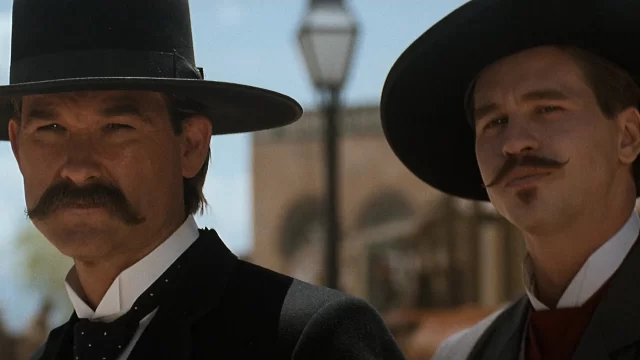Tombstone Is Not OK, by Tyler Smith

If you were to gather a number of American men, age 40-50, and ask them their favorite movies, you won’t be waiting long before somebody mentions George P. Cosmatos’ Tombstone, the 1993 Western about Wyatt Earp and the gunfight at the OK Corral. Between the film’s action and one-liners, Tombstone is often cited as among the best Westerns of the modern era (maybe even the best).
A quintessential “guys’ movie,” the film’s rewatchability is touted as one of its many virtues. I myself have seen the film multiple times, though not for the reasons one might assume. I first watched the movie in the mid 90s with my dad and, frankly, did not think it was that special. Since then, as audience acclaim continues to grow, I have revisited the film every few years to see if my opinion has changed.
It has not. Having thought that age would bring with it new insights into the film, I’ve instead found that the passing years have only made me better able to articulate exactly what I so vehemently dislike about it. Certainly, as I’ve gotten older, I have come to appreciate the Western genre much more than when I was young, but this fact may actually give me less reason to like Tombstone, not more.
My first problem with the film will likely be the most controversial. As I’ve become more familiar with Western tropes, I am convinced more and more that Tombstone doesn’t really understand the spirit of its genre. Moreover, the film might actually resent it. By focusing on the action and devoting precious little time to character development or atmosphere, it evokes the image of a kid watching a movie, but fast forwarding through the “boring parts”. The self reflection of John Ford’s films or the agonizing suspense of Sergio Leone’s Spaghetti Westerns are not to be found here, nor the thoughtful deconstructionism of Clint Eastwood. Instead the film gives us one action sequence after another, barely connected by shallow dialogue that pays lip service to classic Western themes of duty and friendship without ever truly convincing us that it cares about either.
And about that dialogue. The script is trying so hard to be memorable that it often sacrifices character depth and general realism in favor of quotable one-liners. That the film has inspired so many memes seems appropriate. Certainly, other film quotes have found their way into the pop culture, but they gain infinitely more meaning when viewed in the larger context of the film as a whole. This is not the case with Tombstone, which too often seems content to come up with these self-consciously cool lines and just leave it up to the actors to imbue them with any real depth.
At first glance, it would appear that the talented cast is able to transcend the shallowness of the script and create consistent, lived-in characters. The most notable among these is Val Kilmer as Doc Holliday, Wyatt Earp’s terminally ill best friend. When one asks a Tombstone fan what their favorite element of the film is, they will more often than not cite Kilmer’s performance. And understandably so. On the page, Holliday is little more than a collection of traits and witticisms, but Kilmer manages to elevate that to the level of a genuine character, albeit a hollow one. It’s enough to make one wonder just how much more iconic the character would be if Kilmer had been given better material.
When you look at all of this together – the emphasis on action, the empty script, the lack of insight – it adds up to a film at war with itself. It eagerly embraces the style of the genre, but none of the substance. It is a standard, unremarkable action movie, but with tumbleweeds. It is a Western for people that don’t like Westerns. Which, sadly, might explain its popularity.































Thin Red Line is the film I had to revisit after seeing it as a kid because so many people praised it. It confirmed my opinion that Malick’s lack of interest in making a war film should have disqualified him from doing so.